
IkamvaYouth equips learners from disadvantaged communities with the knowledge, skills, networks and resources to access tertiary education and/or employment opportunities once they matriculate. It is a great place for youth that are aiming high in life, who wish to reach great things in future. However, learners who suffer from personal or emotional problems are less likely to succeed academically, stay in school, and develop a love of learning. Some of the Ikamvanites reported a lot of challenges that they experience in their daily lives and requested for assistance.
Ikageng Branch joined forces with Family And Marriage Society of South Africa (FAMSA) to address personal and emotional challenges experienced by Ikamvanites. FAMSA is an organization that aims to empower people to reconstruct, build and maintain a sound quality of life. The purpose of the collaboration is to provide Ikamvanites with support to help them succeed socially, emotionally, and academically. FAMSA committed to provide individual counseling, support groups as well as interactive workshops. The ultimate goal is to promote academic success, enhance health, and prevent behavioral problems.
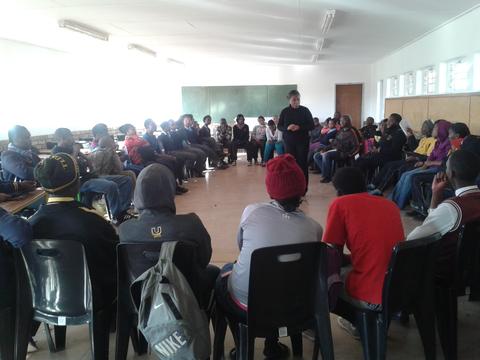

On the 06 of June 2013 Ikageng Branch held an interactive discussion session with the FAMSA team, lead by Ms Rhulani. The session involved a discussion about common issues facing township youths; risky behaviors and unhealthy choices. Ikageng learners reported a lot of challenges experienced by the youth in the Ikageng Township. Ms Rhulani thereafter introduced the concept of a support group as a group that presents information, provides comfort, teaches coping skills, helps reduce anxiety, and provides a place for people to share common concerns and emotional support. Ikamvanites were keen on partaking in the group.
FAMSA volunteered to run workshops during Winter School. They will run workshops within an allocated activity stream. They requested the branch to prepare topics for the workshops, FAMSA suggested topics such as:
- Life Skills
- Self Growth & Development
- Relationship Workshop
- Conflict Management and Problem Solving Techniques
- Emotional Intelligence
- Time Management
- Self Awareness and Awareness of others
- HIV awareness and prevention programs
The interactive workshops will include the use of training tools such as charts, role plays, group discussions and sometimes video footage, the aim is to empower young people in the decisions they will have to make both in the present and in the future.
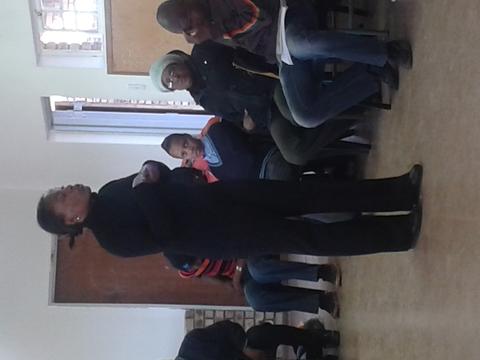
A very special thank you to FAMSA for joining forces with IkamvaYouth in addressing learners’ social and emotional needs and connect such supports to stronger academic achievement.
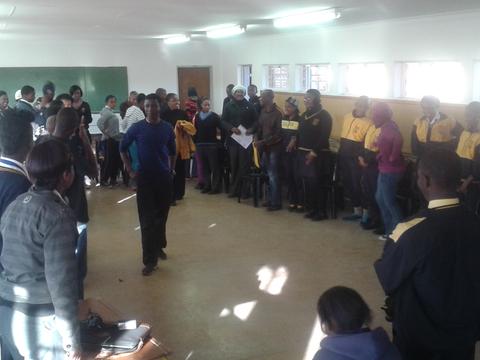
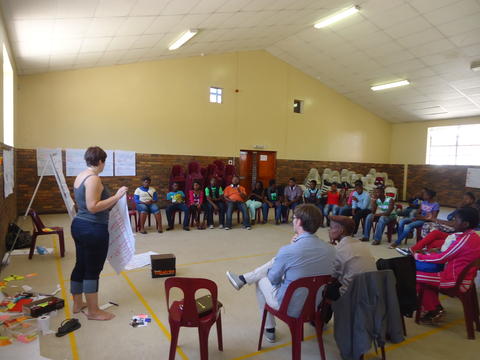

The weekend consisted of planning for 2013 as well as an election to choose the new branch committee as well as choosing the different heads of the different portfolios. Present were more than 30 learners from different grades and tutors and they all had a chance to discuss the decision making, planning and electing the branch committee.
The Main goal of our SPW was to elect a branch committee (in charge of roles and portfolios) and for new volunteers (grade12 from last year returning) to take ownership of programme and become part of the management team. It was also a great weekend for the leaner reps and tutors to get to know each other better.
On Saturday we discussed the year program and we also had a look back at what happened in 2012. The morning started off with an introduction and the group explaining what their expectations of the weekend will be, we then discussed what happened in 2012 and then we ended with looking at what IkamvaYouth is doing well, what challenges we are facing, what IkamvaYouth is offering learners and the community and what we can do to improve the programme. We had a lot of first time branch committee members, but the rest of the group made them all feel included and welcome.
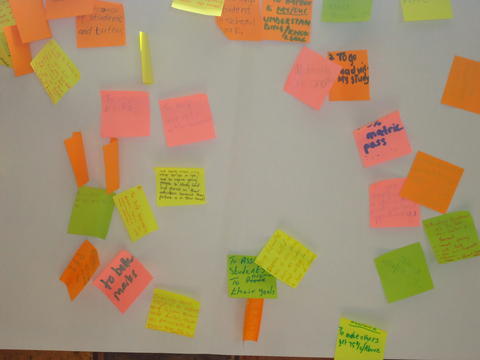
On Sunday the election took place and everyone had a chance to vote for the different nominees. The nomination and election process were very democratic and the nominees had to explain to the group why they were best suited for the different portfolios. The different portfolios were Tutoring, Volunteer Coordination, Career Guidance, Media, Image and Expression, Computer Literacy, Health and Life Skills and Alumni.
The different portfolio members also had to discuss their portfolios and present a plan of action for the group and will need to present this plan of action to all the Ikamvanites at Makhaza. They had to present their goals, when the goals should be reached and by whom. Emihle, a grade 8 learner and newly appointed portfolio member said that the weekend was a dream come true and that she enjoyed the interaction and discussions that took place and that she is really happy and proud for being chosen as part of the health and life skills portfolio.

Mandisi Gladile, a tutor says, “the weekend was really informative and made me realise the value IkamvaYouth adds not only to the learners but also the community and I feel really inspired for the things that we have planned for 2013.”
strategic_planning_week_2013.pdf
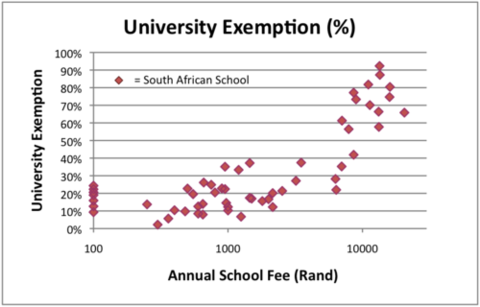
Just over a year ago I was approached by Andrew Einhorn, a UCT grad student, who was interested in implementing an online maths program at Makhaza. All he needed was access to the lab, access to a class and a tutor. A year down the line not only he has completely revamped two of our branches labs in Makhaza and Nyanga, established a formal Khan Academy program in these branches (as well as other locations in Cape Town and rural Eastern Cape), but has produced results at very low costs, and is piloting in schools for 2013.
His passion for creating high impact and stimulating learning environments in township and rural locations often only privy to the wealthy few has seen him start Numeric, an NGO interested in finding ways to bring Khan Academy to South Africa and make it a useful resource to both teachers and learners. He presented an inspiring TEDxUCT talk last year outlining the background, as well as the impact and results Numeric has had. He also posted the following blog on the Khan Academy website:
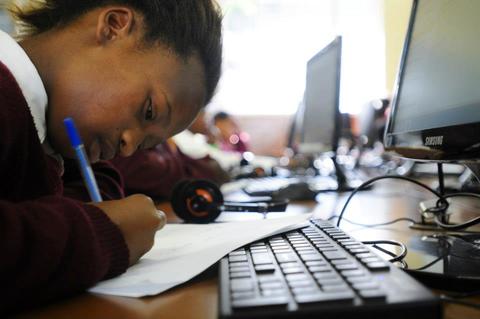
A little over 15 months ago, we started an experiment. We wanted to know if Khan Academy was viable in township (slum) areas in South Africa and if so, what type of impact it might have on numeracy. Numeracy in South Africa is astonishingly weak, with just 2% of Grade 9s scoring over 50% on the annual national assessments in 2012.
And so we set out to see if Khan Academy might be used as a catalyst for change. But before I expound on the results of this experiment, I ought perhaps give a little more background on the environments we’re working in.
Townships in South Africa are not unlike the favelas of Brazil or the slums bordering Delhi and Calcutta in India. They are urban areas that were, until the end of Apartheid in 1994, reserved for non-whites, but have now become residential hubs for the urbanizing masses. They are typically built on the periphery of cities and tend to be characterized by high population density, poverty and unemployment. Picture a ramshackle of makeshift houses constructed out of corrugated iron, wood scraps and cardboard, jigsawed together into a gigantic maze 5 miles wide and 10 miles across. At the risk of generalising grossly, that’s more or less the picture I want you to have in mind as you read this article.
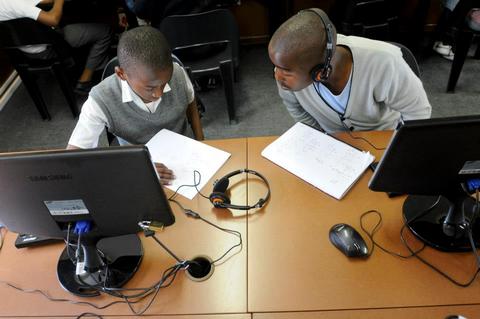
Now, townships in South Africa get a bad rap. They are viewed as ‘dangerous’ places and it is considered unwise to visit them unless you know someone there, or visit them as part of a ‘township tour’. Yet while crime rates in these areas are often high, the reputation does not do justice to the vibrant and persevering people who inhabit them. In particular, townships are YOUNG! On any given day, around two o’clock in the afternoon, the streets flood with uniformed, backpack-toting children on their way home from school. And despite having barely two pennies to rub together, they are meticulously dressed – shiny black shoes, starched white collars – and have aspirations to match. Most of the children in South Africa live in some form of township, which means that children growing up in these environments constitute the better part of the future of our country.
And yet it is supremely difficult to convince our best teachers to go and work in these areas. They are offered good jobs in well-resourced schools most often located in the wealthy suburbs of the cities. Principals at these schools compete fiercely for their skills. And this is as it should be. But it also entrenches the educational bias whereby a child’s access to quality education is directly proportional to the wealth of their family (see chart below).

* University exemption rate refers to the percentage of learners who attain the academic marks in their final year of school that are necessary to gain access to South African universities.
So Numeric’s experiment was to see whether we could use Khan Academy, in conjunction with a slightly less skilled (and often unqualified) math coach, to create the high impact and stimulating learning environments enjoyed by kids living in wealthier suburbs.
The opportunity provided by Khan Academy premised on the following: Videos do not argue about where they are played; they are unaffected by crime and environment. Appropriately licensed, they do not cost anything. They do not grow weary, skip class, or grow jaded. Instead, they convey their message enthusiastically, faithfully, clearly – time and time again. A child may watch just as many videos as he/she has appetite for, and need never feel limited by the dragging on of a boring class or an inept teacher. For many children in South Africa, a Khan Academy video will be their first exposure to what we might term ‘world class instruction’. When complemented by the exercises on the Knowledge Map, Khan Academy becomes a powerful tool for turning the tide on numeracy in South Africa.
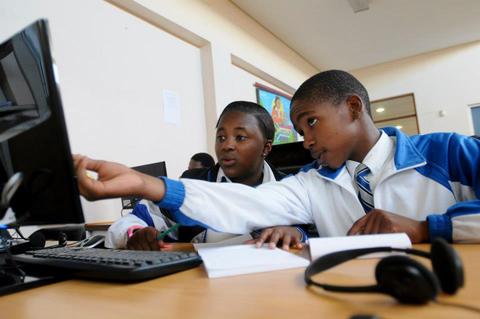
So what were the results of the experiment? Well, it’s probably too early to draw any major conclusions, but we do have a few figures we’d like to share. We currently run 7 Khan Academy classes across 3 different hubs in the Eastern and Western Cape provinces of South Africa. The first pilot group of 20 Grade 9s has just completed its first twelve months of Khan Academy and their numbers are as follows:
* Total Khan Academy hours delivered: 2220
* Total Problems Solved: 27,988
* Total Problems per learner: 1399
* Total Khan Modules Complete: 1232
* Average Modules per learner: 62
Bearing in mind this is an afterschool programme, these are 27,988 math problems that would not otherwise have been attempted. The 62 modules completed by the average learner constitute 62 gaps that those learners have filled. But it’s more about just the numbers; it’s about creating excitement and enthusiasm around learning. This is hard to convey in words, but perhaps a picture will suffice.
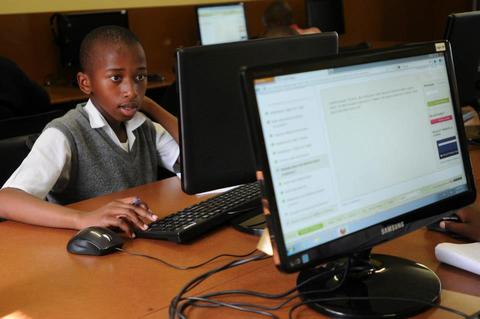
As we always say to our coaches, the tragedy in South Africa is not so much that kids don’t want to learn. It’s that some kids DO want to learn, but can’t. Khan Academy provides us one way to give these kids a world-class education without having to magically replenish our nation’s supply of teachers. And who knows, perhaps one day these kids will become the inspirational and talented teachers we have waited for for so long!
—-
Andrew Einhorn is the founder and current CEO of Numeric.org. His TEDx talk on Numeric.org and Khan Academy is available here.
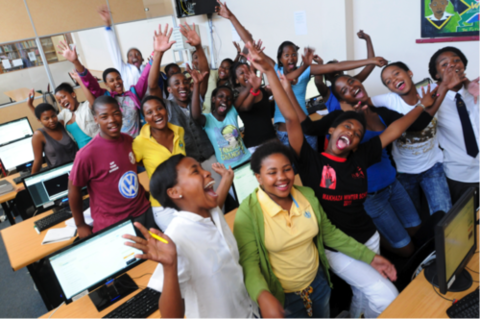
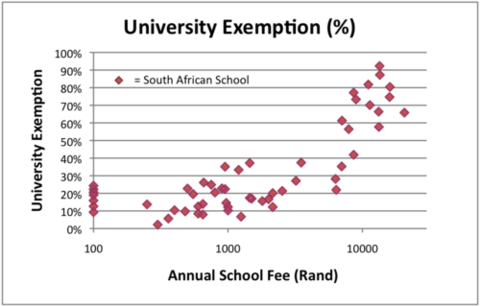
Just over a year ago I was approached by Andrew Einhorn, a UCT grad student, who was interested in implementing an online maths program at Makhaza. All he needed was access to the lab, access to a class and a tutor. A year down the line not only he has completely revamped two of our branches labs in Makhaza and Nyanga, established a formal Khan Academy program in these branches (as well as other locations in Cape Town and rural Eastern Cape), but has produced results at very low costs, and is piloting in schools for 2013.
His passion for creating high impact and stimulating learning environments in township and rural locations often only privy to the wealthy few has seen him start Numeric, an NGO interested in finding ways to bring Khan Academy to South Africa and make it a useful resource to both teachers and learners. He presented an inspiring TEDxUCT talk last year outlining the background, as well as the impact and results Numeric has had. He also posted the following blog on the Khan Academy website:

A little over 15 months ago, we started an experiment. We wanted to know if Khan Academy was viable in township (slum) areas in South Africa and if so, what type of impact it might have on numeracy. Numeracy in South Africa is astonishingly weak, with just 2% of Grade 9s scoring over 50% on the annual national assessments in 2012.
And so we set out to see if Khan Academy might be used as a catalyst for change. But before I expound on the results of this experiment, I ought perhaps give a little more background on the environments we’re working in.
Townships in South Africa are not unlike the favelas of Brazil or the slums bordering Delhi and Calcutta in India. They are urban areas that were, until the end of Apartheid in 1994, reserved for non-whites, but have now become residential hubs for the urbanizing masses. They are typically built on the periphery of cities and tend to be characterized by high population density, poverty and unemployment. Picture a ramshackle of makeshift houses constructed out of corrugated iron, wood scraps and cardboard, jigsawed together into a gigantic maze 5 miles wide and 10 miles across. At the risk of generalising grossly, that’s more or less the picture I want you to have in mind as you read this article.

Now, townships in South Africa get a bad rap. They are viewed as ‘dangerous’ places and it is considered unwise to visit them unless you know someone there, or visit them as part of a ‘township tour’. Yet while crime rates in these areas are often high, the reputation does not do justice to the vibrant and persevering people who inhabit them. In particular, townships are YOUNG! On any given day, around two o’clock in the afternoon, the streets flood with uniformed, backpack-toting children on their way home from school. And despite having barely two pennies to rub together, they are meticulously dressed – shiny black shoes, starched white collars – and have aspirations to match. Most of the children in South Africa live in some form of township, which means that children growing up in these environments constitute the better part of the future of our country.
And yet it is supremely difficult to convince our best teachers to go and work in these areas. They are offered good jobs in well-resourced schools most often located in the wealthy suburbs of the cities. Principals at these schools compete fiercely for their skills. And this is as it should be. But it also entrenches the educational bias whereby a child’s access to quality education is directly proportional to the wealth of their family (see chart below).

* University exemption rate refers to the percentage of learners who attain the academic marks in their final year of school that are necessary to gain access to South African universities.
So Numeric’s experiment was to see whether we could use Khan Academy, in conjunction with a slightly less skilled (and often unqualified) math coach, to create the high impact and stimulating learning environments enjoyed by kids living in wealthier suburbs.
The opportunity provided by Khan Academy premised on the following: Videos do not argue about where they are played; they are unaffected by crime and environment. Appropriately licensed, they do not cost anything. They do not grow weary, skip class, or grow jaded. Instead, they convey their message enthusiastically, faithfully, clearly – time and time again. A child may watch just as many videos as he/she has appetite for, and need never feel limited by the dragging on of a boring class or an inept teacher. For many children in South Africa, a Khan Academy video will be their first exposure to what we might term ‘world class instruction’. When complemented by the exercises on the Knowledge Map, Khan Academy becomes a powerful tool for turning the tide on numeracy in South Africa.

So what were the results of the experiment? Well, it’s probably too early to draw any major conclusions, but we do have a few figures we’d like to share. We currently run 7 Khan Academy classes across 3 different hubs in the Eastern and Western Cape provinces of South Africa. The first pilot group of 20 Grade 9s has just completed its first twelve months of Khan Academy and their numbers are as follows:
* Total Khan Academy hours delivered: 2220
* Total Problems Solved: 27,988
* Total Problems per learner: 1399
* Total Khan Modules Complete: 1232
* Average Modules per learner: 62
Bearing in mind this is an afterschool programme, these are 27,988 math problems that would not otherwise have been attempted. The 62 modules completed by the average learner constitute 62 gaps that those learners have filled. But it’s more about just the numbers; it’s about creating excitement and enthusiasm around learning. This is hard to convey in words, but perhaps a picture will suffice.

As we always say to our coaches, the tragedy in South Africa is not so much that kids don’t want to learn. It’s that some kids DO want to learn, but can’t. Khan Academy provides us one way to give these kids a world-class education without having to magically replenish our nation’s supply of teachers. And who knows, perhaps one day these kids will become the inspirational and talented teachers we have waited for for so long!
—-
Andrew Einhorn is the founder and current CEO of Numeric.org. His TEDx talk on Numeric.org and Khan Academy is available here.


It may have been about 2 months ago since we’ve had our winter school programme at the Masi branch, but yet it feels like 2 weeks ago. We hosted it at the Masiphumelele library, which is also our venue for the homework and tutoring sessions. Despite all the challenges we faced during the preparation of the programme, and with the help of our World Teach, local volunteers and Masi library staff, we managed to deliver an awesome winter school for our 87 learners…filled with tutoring and great workshops, from Creative Writing to Life Science experiments.
Besides the tutoring sessions that took place in the mornings,


The ever so handy Answer Series books for Grade 10 – 12.
This is what also went down during the afternoons
- Nadia Kimmie offered her skills and ran a pottery workshop with some of the learners (below is some of the work the learners did themselves),

Creativity at its best, right?
- A leadership workshop ran by Nico. This helped the learners a lot in boosting their confidence, taking initiative, and to always rise to the occasion.
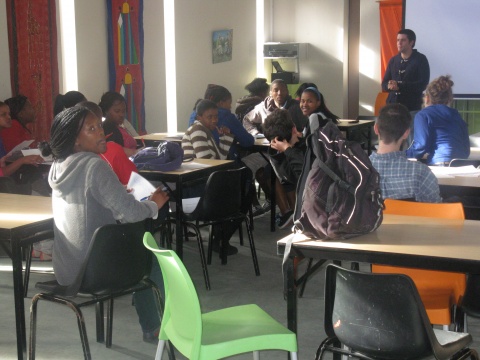
- Ros and Dorothy from Fundza as well as Kate (a volunteer from World Teach) facilitated Creative Writing workshops for the learners. At the end, the learners were able to write their own poems as well as short stories. You’ll never know maybe the next Harmony High Series book will be written by an Ikamvanite…Watch this space!



Ziyanda Mwanda conducted Life Science and Chemistry experiments with the science learners. Here are some of the experiments conducted: looking at mitosis and understanding the process, testing for the presence of starch, observing osmosis using plant tissue, what are acids and bases – using household products and food. HIP2B2 got the learners thinking on their feet…who said math and science was boring? Learners had to conduct fun experiments and the team with the best results won a prize.
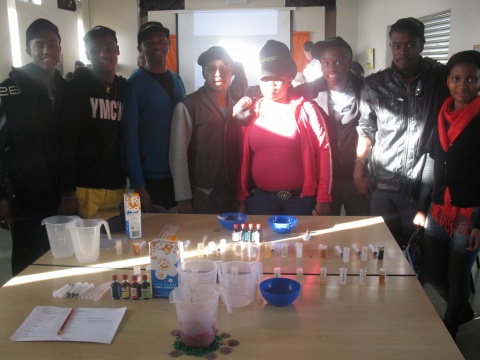

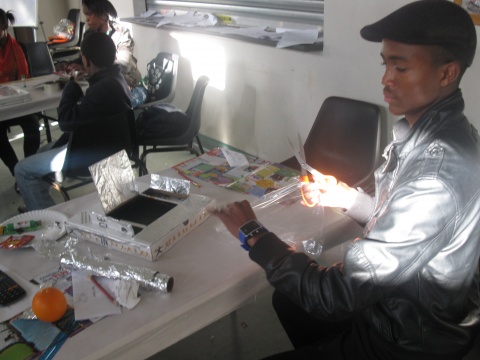
Siobhan Hayes (our Canadian intern) facilitated entrepreneurship workshops where learners knew more about how to start a business, marketing, and on the last day of the winter school programme the learners (Company name: Popcorn Divas) sold popcorns to their fellow Masinites.
Capitec Bank ran a financial literacy workshop whereby learners got to know the importance of saving money and why one should budget.
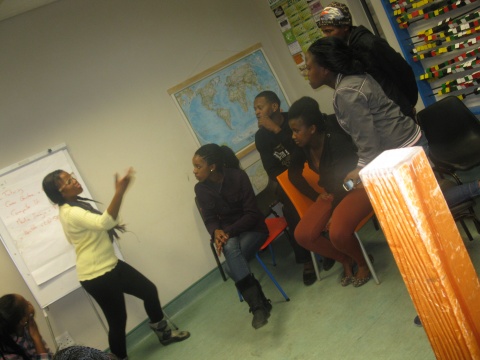
The UWC HIV/AIDS Peer Education Programme joined us and their peer educators ran a health and life skills workshop. As we know, the youth is involved in risky behavior, so the learners learnt quite a lot and importantly, how to take care of themselves. OIL Sexual Health also ran a sexual education workshop. The Live Mag team also took part and ran a media and arts workshop.
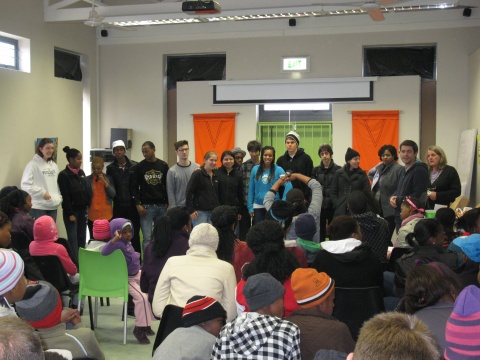
ERM (Environmental Resources Management) teamed up with the learners and got to work on an Environmental Management Plan for our branch, which looks at the environment and sustainability. The learners also got know more about careers in the environmental field, thanks to ERM.
Mathew (from the Cape Leopard Trust) took some of the learners on a hike at Silvermine where they got to know more about nature and the environment and also preserving it.
Thanks to Nick Jones for facilitated a history workshop, Nate and Buhle who ran a debating workshop with the learners…philosophical stuff I tell you. Fatima (a Pilot) ran an aeronautics workshop with the learners, where they got to know more about airplanes.
And all of this was just some of the things that happened. All the hard work put in was really worth it at the end. THANK YOU TO EVERYONE WHO WAS PART OF THIS AMAZING TWO WEEKS!!! Those above-mentioned are just a few of them. The winter school wouldn’t have been that awesome without you.
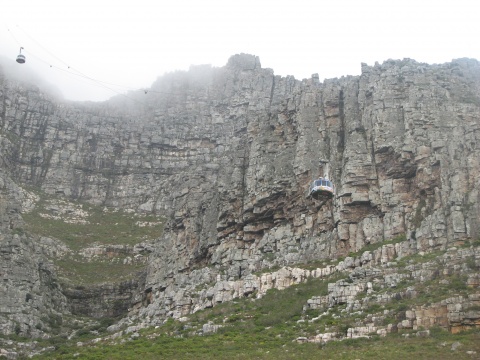
This past Sunday the Masinites hit Table Mountain. Despite the outing being cancelled twice during winter school because of unpredictable Cape Town weather, the learners finally made it to the top of our local natural wonder of the world! Thirty-five learners and several volunteers ascended in the cable car and braved the icy temperatures to explore the top of the mountain. Visibility was not ideal, but the fog did clear enough to take in the stunning views of Cape Town. It was great to have an outing together and reward everyone for their hard work and dedication to IkamvaYouth!
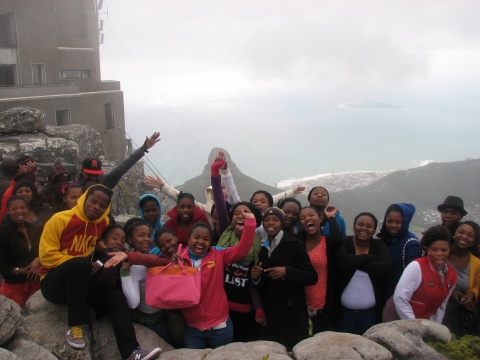
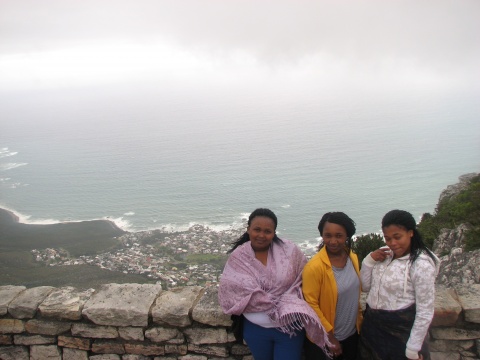

































 Lloyd Lungu
Lloyd Lungu